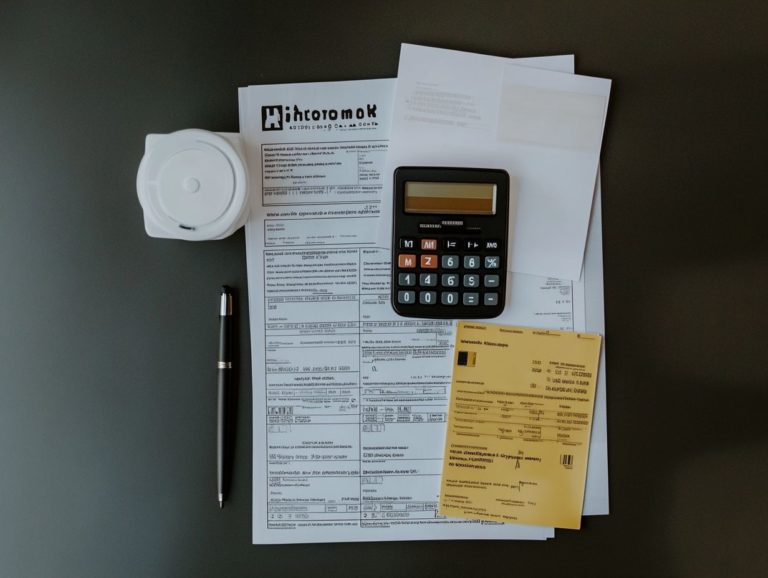Tips for Filing Taxes When You Work Multiple Jobs
Navigating the complexities of taxes can be daunting when you re managing multiple jobs, especially with a second job in the gig economy. Each source of income introduces its own set of rules, deductions, and potential pitfalls that you need to know about.
Get ready to tackle your taxes with confidence! This guide will help you understand your unique tax situation, organize your earnings as a freelancer or independent contractor, and maximize your deductions. It also points out common mistakes to avoid and indicates when it might be wise to seek assistance from tax professionals.
Whether you re a side hustler or juggling several part-time roles, these insights will empower you to file your taxes confidently, especially when dealing with state taxes.
Contents
- Key Takeaways:
- Understanding Your Tax Situation
- Organizing Your Income and Expenses
- Maximizing Your Tax Deductions
- Filing Your Taxes with Multiple Jobs
- Common Mistakes to Avoid
- Seeking Professional Help
- Frequently Asked Questions
- 1. What are some tips for filing taxes when you work multiple jobs?
- 2. Can I file my taxes separately for each job?
- 3. How does having multiple jobs affect my tax bracket?
- 4. Do I have to pay taxes on income from all my jobs?
- 5. What are some common mistakes to avoid when filing taxes with multiple jobs?
- 6. Are there any tax breaks for people who work multiple jobs?
Key Takeaways:

- Understand how multiple jobs can affect your taxes to avoid surprises at tax time.
- Keep track of all income sources and deductible expenses from each job to maximize your tax deductions, especially regarding your independent contractor status.
- Consider seeking professional help to ensure accuracy and avoid common mistakes when filing taxes for multiple jobs.
Understanding Your Tax Situation
Understanding your tax situation is essential, especially if you’re balancing a second job or engaging in the gig economy, where tax obligations can be complex. As an independent contractor or freelancer, your income streams can differ greatly, leading to distinct tax obligations and filing requirements.
Know the IRS rules to avoid penalties, including fines for underreporting income, and position yourself to reach your financial goals more effectively.
How Multiple Jobs Affect Your Taxes
Having multiple jobs, such as a side gig in the gig economy, can significantly impact your taxes, influencing your tax bracket and potential withholding. This situation complicates the process of reporting additional income to the IRS, leading to confusion about your overall tax liability and potential tax penalties.
When juggling various gigs, you might find yourself pushed into a higher tax bracket, as your combined earnings can exceed income thresholds. For instance, if you re working as a freelance graphic designer alongside a traditional job, you might not accurately estimate your tax payments by relying solely on withholding from your main job. This can lead to a hefty tax bill at year-end or even penalties for underpayment.
As a gig worker, you may need to pay a tax on income earned from working for yourself, which complicates your financial landscape further. This reality necessitates meticulous record-keeping, especially regarding your freelancer income, to manage your obligations effectively and avoid unwelcome surprises come tax season.
Organizing Your Income and Expenses
Organizing your income and expenses is crucial for successfully filing your taxes, particularly as a freelancer or independent contractor managing multiple income streams. Don t wait until tax season to start organizing your finances!
By maintaining meticulous records, you ll identify deductible expenses and fully leverage your tax benefits, such as the home office deduction, which is vital for independent contractors. This attention to detail not only simplifies the process but also ensures you re optimizing your financial situation.
Keeping Track of All Income Sources
Keeping track of your income sources is essential as a freelancer or independent contractor. It s critical for accurately reporting your earnings to the IRS and ensuring compliance with state tax returns. You ll need to be familiar with forms like Form 1099-NEC for nonemployee compensation. This diligence helps prevent underreporting your income and protects you from potential tax penalties.
Throughout the year, you may find various income streams arising, from side gigs and freelance projects to passive income from investments. Properly documenting these sources not only ensures compliance but also provides valuable insight into your overall earnings and helps track your potential maximum refund, enhancing your financial planning.
Using Form 1099-NEC is crucial when reporting earnings over $600 from clients or businesses. This underscores the importance of keeping accurate records of your invoices and payments. Common income sources include:
- Graphic design work
- Consultation fees
- Affiliate marketing commissions
By meticulously logging these transactions, you can confidently submit your tax return, getting the most back on your taxes while minimizing the risk of audits, especially with the additional income from your side gig.
Deductible Expenses for Multiple Jobs

Identifying deductible expenses across your various jobs is crucial for optimizing your tax deductions and reaching significant financial milestones. Options like the home office deduction are available for eligible taxpayers, allowing you to claim what you rightfully deserve. Tax software can streamline this process, ensuring you don t overlook any potential deductions.
Consider expenses related to travel, continuing education, and supplies that directly enhance your work performance. This includes costs associated with maintaining your home office deduction. Recognizing these deductible expenses can significantly lower your tax liability, which in turn can bolster your overall financial health.
By maintaining accurate records and using user-friendly platforms, you can confidently navigate complex tax regulations and maximize your savings. Tax software such as TurboTax Premium helps identify applicable deductions and provides valuable prompts, ensuring you explore every avenue for reducing your taxable income. This proactive approach to financial management can lead to considerable monetary benefits.
Maximizing Your Tax Deductions
Getting the most back on your taxes represents a strategic pathway to lowering your overall tax liability and reaching your financial goals. By leveraging effective strategies and utilizing services such as TurboTax Live, you can optimize your deductions while ensuring full compliance with IRS requirements and maintaining accurate records for your additional income.
Strategies for Reducing Your Tax Liability
Implementing effective strategies to reduce your tax liability can profoundly impact your financial milestones, especially when navigating the complexities of estimated taxes, including quarterly payments. It’s important to understand how tax deductions affect what you owe and your overall fiscal responsibility.
Explore various strategies to minimize your tax burden, such as making regular estimated tax payments throughout the year instead of waiting until the last minute. Effectively utilizing deductions, whether for business expenses or your home office setup, can significantly lower your taxable income.
If you re juggling multiple jobs, keeping meticulous records of your earnings and withholdings is crucial to avoid unwelcome surprises come tax season. This includes earnings from both your traditional job and side gig.
Creating a budget that accounts for potential tax implications can further enhance your financial planning. Seeking advice from a tax professional can provide tailored insights that ensure compliance and maximize your returns.
Are you ready to save money on your taxes? Take action today and consult a tax professional to optimize your deductions!
Filing Your Taxes with Multiple Jobs
Filing your taxes can feel overwhelming, but it doesn t have to be! Managing multiple jobs is a complex task that requires your attention to various tax forms. You’ll need to understand Form 1040 for individual tax returns, as well as any relevant state tax returns.
It’s crucial to understand what each form requires to ensure your filing is accurate and timely, especially if you are an independent contractor or freelancer.
Choosing the Right Tax Forms
Selecting the correct tax forms is essential for reporting income from different job types, including traditional employment and freelance work. For traditional jobs, use Form W-2. For freelance work, rely on Form W-9 or Form 1099-NEC, as each serves a specific purpose according to IRS requirements.
Understanding these forms can save you from costly mistakes. Employers provide Form W-2 to report your annual wages and withheld taxes, making it crucial for anyone in a salaried position. If you’re an independent contractor or freelancer, get familiar with Form W-9 for supplying necessary information to clients, while Form 1099-NEC reports nonemployee compensation.
Obtaining these forms is easy. You can find them online through the IRS website or request them from your employers and clients. Accurate completion of each form requires meticulous record-keeping of your income and deductions to comply with IRS regulations.
Filing Status and Exemptions

Understanding your filing status and available exemptions is essential in determining your overall tax liability. This can significantly influence your tax return and financial milestones.
The IRS recognizes several filing statuses: Single, Married Filing Jointly, Married Filing Separately, Head of Household, and Qualifying Widow(er). Each category affects how your income is taxed, leading to different tax rates and standard deduction amounts. If you qualify as Head of Household, you may enjoy a higher standard deduction and more favorable tax brackets than if you filed as Single.
Exemptions further reduce your taxable income by allowing you to deduct a specific amount for yourself and your dependents. For instance, a family of four with applicable exemptions can significantly lower their taxable income, impacting their overall tax burden.
Grasping these nuances enables you to make informed decisions that positively affect your financial health.
Common Mistakes to Avoid
Navigating the details of tax filing requires a keen eye to avoid common mistakes. This is crucial for sidestepping potential penalties and fines, especially for freelancers and independent contractors, who may accidentally underreport their income if they aren t vigilant.
By being aware of these pitfalls, you can ensure a more seamless and stress-free tax filing experience.
Errors to Watch Out For
Filing errors can lead to complications, such as your tax return being rejected by the IRS, especially if you miss reporting thresholds or misinterpret IRS requirements.
Be particularly vigilant about miscalculating your income, overlooking eligible deductions, or incorrectly filing as a dependent. A common misconception is that if you earn below a certain threshold, you don t need to file at all this isn t always true. Using outdated forms can also lead to inaccuracies.
To avoid these pitfalls, thoroughly review all entries. Double-check Social Security numbers and maintain meticulous records throughout the year to enhance the accuracy of your tax returns before submission. Utilizing tax preparation software or consulting with a tax professional can provide an extra layer of assurance.
Start organizing your tax documents today to make filing easier!
Seeking Professional Help
Seeking professional help from tax experts can offer you invaluable support in navigating the complexities of filing taxes. This is especially true if you re juggling multiple jobs and aiming for a significant financial milestone.
Utilizing services like TurboTax Live can provide personalized guidance, ensuring that you remain compliant with IRS requirements while maximizing your financial potential.
When to Consider Hiring a Tax Professional
Hiring a tax professional is crucial when you encounter complex tax situations. This includes managing freelancer income or juggling multiple income streams. Their expertise allows them to navigate the intricacies of tax filing, helping you achieve your financial milestones with confidence.
For instance, if you are balancing income from various part-time jobs, investments, or freelance projects, the tax implications can swiftly become overwhelming. To navigate this complexity, it’s wise to consider tips for filing taxes with multiple income streams. Each income source may have specific deductions or tax credits that a tax professional can expertly identify.
Unique circumstances, such as receiving unemployment benefits or experiencing significant life changes like marriage or purchasing a home can further complicate your tax landscape. Don’t wait until the last minute getting professional help early can save you money in the long run.
When searching for the right expert, consider their specialization, experience with similar tax scenarios, and client reviews. This guidance can help you find optimized tax strategies that are perfectly tailored to your individual financial goals.
Frequently Asked Questions

1. What are some tips for filing taxes when you work multiple jobs?
Wondering how to tackle your taxes with multiple jobs? One tip is to keep track of all your income from each job, including any bonuses or tips. Also, make sure to report all deductions, such as work-related expenses or student loan interest.
Filing electronically can help streamline the process.
2. Can I file my taxes separately for each job?
No, you must report all of your income from all jobs on one tax return. However, you can claim deductions or credits for each job separately if they qualify.
3. How does having multiple jobs affect my tax bracket?
If you have multiple jobs, your total income may push you into a higher tax bracket. This means you may owe more in taxes. It’s important to keep track of your income and adjust your withholding accordingly.
4. Do I have to pay taxes on income from all my jobs?
Yes, all income from all jobs must be reported and may be subject to taxes. However, you may be able to deduct certain expenses related to each job, so it’s important to keep track of all your income and expenses.
5. What are some common mistakes to avoid when filing taxes with multiple jobs?
One mistake is forgetting to report all your income, including freelance or side gig income. Another mistake is not properly allocating deductions or credits between your jobs. It’s important to carefully review all forms and double-check all information to avoid errors.
6. Are there any tax breaks for people who work multiple jobs?
Yes, there are certain deductions and credits that may be available for individuals who work multiple jobs. For example, you may be able to deduct expenses for traveling between jobs or qualify for the Earned Income Tax Credit.
It’s crucial to research and consult with a tax professional to see which tax breaks apply to your situation.






